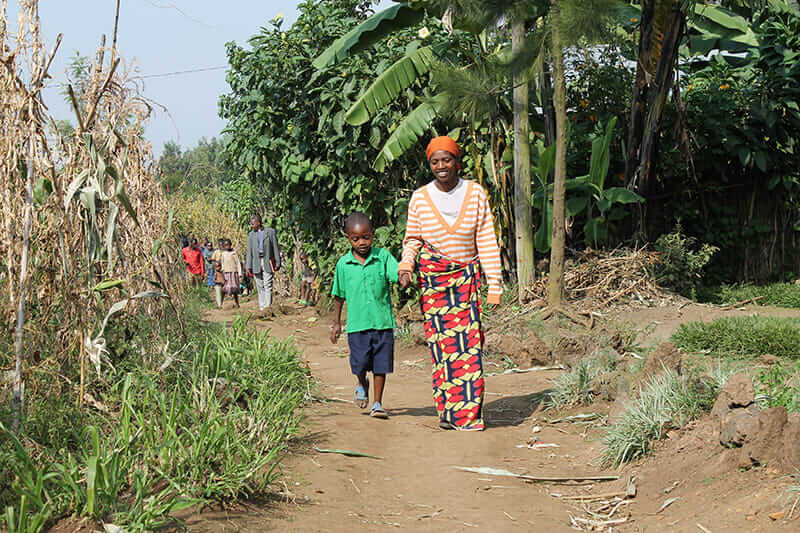The Children and the Egg: Can a Simple Snack Change Lives in Rwanda?
Preschoolers in Busogo receive an “egg-ucation” – three hours of lessons and a hard-boiled treat at the end.
The Children and the Egg: Can a Simple Snack Change Lives in Rwanda?
Preschoolers in Busogo receive an “egg-ucation” – three hours of lessons and a hard-boiled treat at the end.

For these three- to six-years-olds, eggs represent an infusion of protein into often deficient diets. Emerging from the devastation of the genocide 20 years ago, Rwanda has made great gains socially and economically: In 2010/2011, the percentage of Rwandans living in poverty dropped to 45% from 57% five years before, as one million people gained a foothold up the socioeconomic ladder. In places like Busogo and other small Rwandan villages, however, there are reminders of persistent poverty, like the distended belly of a child who is not getting enough – or the right – nutrition.

That’s where the egg comes in. A U.S.-based NGO called OneEgg has partnered with the Anglican Shyira Diocese, which operates about 220 preschools in the Northern Province. Any child, regardless of religious affiliation, may attend the preschools.
Thus far, thanks to OneEgg sponsors, 15 preschools receive eggs each school day to promote physical and cognitive development in the children. (Research currently underway appears to validate that children plus daily eggs equals better growth). The plan is to expand the egg distribution to as many preschools as possible.

The eggs are sourced from a local farm, which is supported by American agricultural specialists from Tyson Foods and its Cobb Vantress research arm, and is managed by and employs Rwandan workers. The farm teaches agricultural best practices, creates jobs, and increases the availability of eggs.
The circle from chicken-to-egg is completed in the hands of preschool children in places like Busogo, where eggs complement the compatible goals of child security, education, hygiene, and spiritual development, as well as poverty alleviation for working mothers. Because of these preschools, the women in the villages, who account for most of the farmers in Rwanda, are able to do their daily work – growing crops, gathering firewood, toting water – without worrying about leaving their young children unattended.

Unlike the image of the typical American preschool, the one in Busogo is neither brightly lit nor filled with educational toys in primary colors. In fact, the Busogo preschoolers are split between two mud brick classrooms with dirt floors and no glass in the windows. Wooden shutters let in the only light. Amid these rustic conditions, though, learners between the ages of three and six recite the alphabet, count, and sing in Kinyarwanda and English.
“We show the parents the benefit of early childhood education and how this can make a difference in the community,” said Rev. Dr. Laurent Mbanda, Bishop of Shyira Diocese, and a former executive with Compassion International.

For the preschoolers at places like Busogo, the program might be thought of as “egg-ucation” – three hours of lessons and a hard-boiled treat at the end. As the eggs are distributed, little fingers that can’t quite manage the peeling are helped by teachers or volunteers parents, including the minister’s wife, who walks among the children with a baby swaddled on her back
One mother at Busogo, speaking through an interpreter, praised the preschool program where her child learns to count and speak a little English, and socializes with others. “And he gets an egg every day,” she said. “That makes him healthy.”
Follow us

This work is licensed under a Creative Commons Attribution-NoDerivatives 4.0 International License.
Want to republish a Modern Farmer story?
We are happy for Modern Farmer stories to be shared, and encourage you to republish our articles for your audience. When doing so, we ask that you follow these guidelines:
Please credit us and our writers
For the author byline, please use “Author Name, Modern Farmer.” At the top of our stories, if on the web, please include this text and link: “This story was originally published by Modern Farmer.”
Please make sure to include a link back to either our home page or the article URL.
At the bottom of the story, please include the following text:
“Modern Farmer is a nonprofit initiative dedicated to raising awareness and catalyzing action at the intersection of food, agriculture, and society. Read more at <link>Modern Farmer</link>.”
Use our widget
We’d like to be able to track our stories, so we ask that if you republish our content, you do so using our widget (located on the left hand side of the article). The HTML code has a built-in tracker that tells us the data and domain where the story was published, as well as view counts.
Check the image requirements
It’s your responsibility to confirm you're licensed to republish images in our articles. Some images, such as those from commercial providers, don't allow their images to be republished without permission or payment. Copyright terms are generally listed in the image caption and attribution. You are welcome to omit our images or substitute with your own. Charts and interactive graphics follow the same rules.
Don’t change too much. Or, ask us first.
Articles must be republished in their entirety. It’s okay to change references to time (“today” to “yesterday”) or location (“Iowa City, IA” to “here”). But please keep everything else the same.
If you feel strongly that a more material edit needs to be made, get in touch with us at [email protected]. We’re happy to discuss it with the original author, but we must have prior approval for changes before publication.
Special cases
Extracts. You may run the first few lines or paragraphs of the article and then say: “Read the full article at Modern Farmer” with a link back to the original article.
Quotes. You may quote authors provided you include a link back to the article URL.
Translations. These require writer approval. To inquire about translation of a Modern Farmer article, contact us at [email protected]
Signed consent / copyright release forms. These are not required, provided you are following these guidelines.
Print. Articles can be republished in print under these same rules, with the exception that you do not need to include the links.
Tag us
When sharing the story on social media, please tag us using the following: - Twitter (@ModFarm) - Facebook (@ModernFarmerMedia) - Instagram (@modfarm)
Use our content respectfully
Modern Farmer is a nonprofit and as such we share our content for free and in good faith in order to reach new audiences. Respectfully,
No selling ads against our stories. It’s okay to put our stories on pages with ads.
Don’t republish our material wholesale, or automatically; you need to select stories to be republished individually.
You have no rights to sell, license, syndicate, or otherwise represent yourself as the authorized owner of our material to any third parties. This means that you cannot actively publish or submit our work for syndication to third party platforms or apps like Apple News or Google News. We understand that publishers cannot fully control when certain third parties automatically summarize or crawl content from publishers’ own sites.
Keep in touch
We want to hear from you if you love Modern Farmer content, have a collaboration idea, or anything else to share. As a nonprofit outlet, we work in service of our community and are always open to comments, feedback, and ideas. Contact us at [email protected].by Patricia Crisafulli, Modern Farmer
August 6, 2014
Modern Farmer Weekly
Solutions Hub
Innovations, ideas and inspiration. Actionable solutions for a resilient food system.
ExploreExplore other topics
Share With Us
We want to hear from Modern Farmer readers who have thoughtful commentary, actionable solutions, or helpful ideas to share.
SubmitNecessary cookies are absolutely essential for the website to function properly. This category only includes cookies that ensures basic functionalities and security features of the website. These cookies do not store any personal information.
Any cookies that may not be particularly necessary for the website to function and are used specifically to collect user personal data via analytics, ads, other embedded contents are termed as non-necessary cookies.